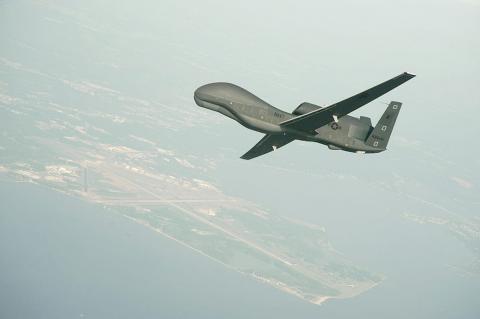The US will use its most advanced unmanned reconnaissance aircraft to monitor Chinese activity in waters surrounding the Diaoyutai Islands (釣魚台), the object of an acrimonious dispute between Beijing and Tokyo, Japanese media are reporting.
The decision was made during a meeting between Japanese Defense Minister Satoshi Morimoto and US Secretary of Defense Leon Panetta at the Pentagon on Sunday, NHK and the Yomiuri Shimbun said, adding that the drones would also conduct surveillance around Okinawa.
At least three unarmed Northrop Grumman RQ-4 Global Hawk drones have been deployed at Andersen Air Force Base on Guam since September 2010, bolstering the operational intelligence capabilities of US forces in the Asia-Pacific.

Photo: Reuters
Operating at an altitude of about 18,000m, the RQ-4 provides near-real-time, long-range intelligence, surveillance and reconnaissance imagery by means of a high-resolution synthetic aperture radar. It played a role in damage assessment following the disaster at Japan’s Fukushima Dai-ichi nuclear power plant in March last year.
Amid rising tensions between Japan and China over the disputed islets, the Japan Maritime Self-Defense Force has mostly relied on P-3C “Orion” surveillance aircraft to monitor Chinese naval activity in the area.
Taiwan also claims sovereignty over the islands.
Tetsuo Kotani, a fellow at The Japan Institute of International Affairs in Tokyo, said the deployment sends an important message.
“One of the urgent issues for the US-Japan alliance is to enhance intelligence, surveillance and reconnaissance [ISR] cooperation,” he told the Taipei Times yesterday. “The Global Hawk can serve as a symbol of allied ISR cooperation.”
“This is an important step for the alliance and sends a strong message to Beijing that Washington stands firmly with Tokyo,” he said.
Although the US does not officially take a position on the sovereignty dispute, some believe the Diaoyutais fall within the scope of Article 5 of the US-Japan Treaty of Mutual Co-operation and Security.
However, Kotani said Beijing should not misunderstand the real message.
“This is US reassurance to Japan. As long as Japan is reassured by the US, Japan does not have to take provocative actions vis-a-vis Beijing over the Senkakus,” he said. “No country wants to increase the tensions.”
The Diaoyutais are known as the Senkaku Islands in Japan.
During Sunday’s meeting, Panetta and Morimoto also agreed to explore eventual revisions of the Guidelines for Japan-US Defense Cooperation, which govern cooperation between the Japan Self-Defense Forces and the US military during crises.
Passed in 1978, the guidelines were substantially revised in 1997 in response to the North Korean nuclear program.
“We shared the view that it’s important to jointly study and discuss [security matters], taking into consideration changes in the security environment and what Japan-US cooperation should be,” Morimoto told a press conference.
According to the Yomiuri Shimbun, the review will focus on defense cooperation on the Nansei Islands in response to Chinese military expansion and increasing activity in waters surrounding Japan, as well as North Korea’s nuclear and missile development and post-disaster cooperation.
No specific procedures or timeline for the review were discussed.

CHAOS: Iranians took to the streets playing celebratory music after reports of Khamenei’s death on Saturday, while mourners also gathered in Tehran yesterday Iranian Supreme Leader Ayatollah Ali Khamenei was killed in a major attack on Iran launched by Israel and the US, throwing the future of the Islamic republic into doubt and raising the risk of regional instability. Iranian state television and the state-run IRNA news agency announced the 86-year-old’s death early yesterday. US President Donald Trump said it gave Iranians their “greatest chance” to “take back” their country. The announcements came after a joint US and Israeli aerial bombardment that targeted Iranian military and governmental sites. Trump said the “heavy and pinpoint bombing” would continue through the week or as long

TRUST: The KMT said it respected the US’ timing and considerations, and hoped it would continue to honor its commitments to helping Taiwan bolster its defenses and deterrence US President Donald Trump is delaying a multibillion-dollar arms sale to Taiwan to ensure his visit to Beijing is successful, a New York Times report said. The weapons sales package has stalled in the US Department of State, the report said, citing US officials it did not identify. The White House has told agencies not to push forward ahead of Trump’s meeting with Chinese President Xi Jinping (習近平), it said. The two last month held a phone call to discuss trade and geopolitical flashpoints ahead of the summit. Xi raised the Taiwan issue and urged the US to handle arms sales to

State-run CPC Corp, Taiwan (CPC, 台灣中油) yesterday said that it had confirmed on Saturday night with its liquefied natural gas (LNG) and crude oil suppliers that shipments are proceeding as scheduled and that domestic supplies remain unaffected. The CPC yesterday announced the gasoline and diesel prices will rise by NT$0.2 and NT$0.4 per liter, respectively, starting Monday, citing Middle East tensions and blizzards in the eastern United States. CPC also iterated it has been reducing the proportion of crude oil imports from the Middle East and diversifying its supply sources in the past few years in response to geopolitical risks, expanding

Pro-democracy media tycoon Jimmy Lai’s (黎智英) fraud conviction and prison sentence were yesterday overturned by a Hong Kong court, in a surprise legal decision that comes soon after Lai was jailed for 20 years on a separate national security charge. Judges Jeremy Poon (潘兆初), Anthea Pang (彭寶琴) and Derek Pang (彭偉昌) said in the judgement that they allowed the appeal from Lai, and another defendant in the case, to proceed, as a lower court judge had “erred.” “The Court of Appeal gave them leave to appeal against their conviction, allowed their appeals, quashed the convictions and set aside the sentences,” the judges